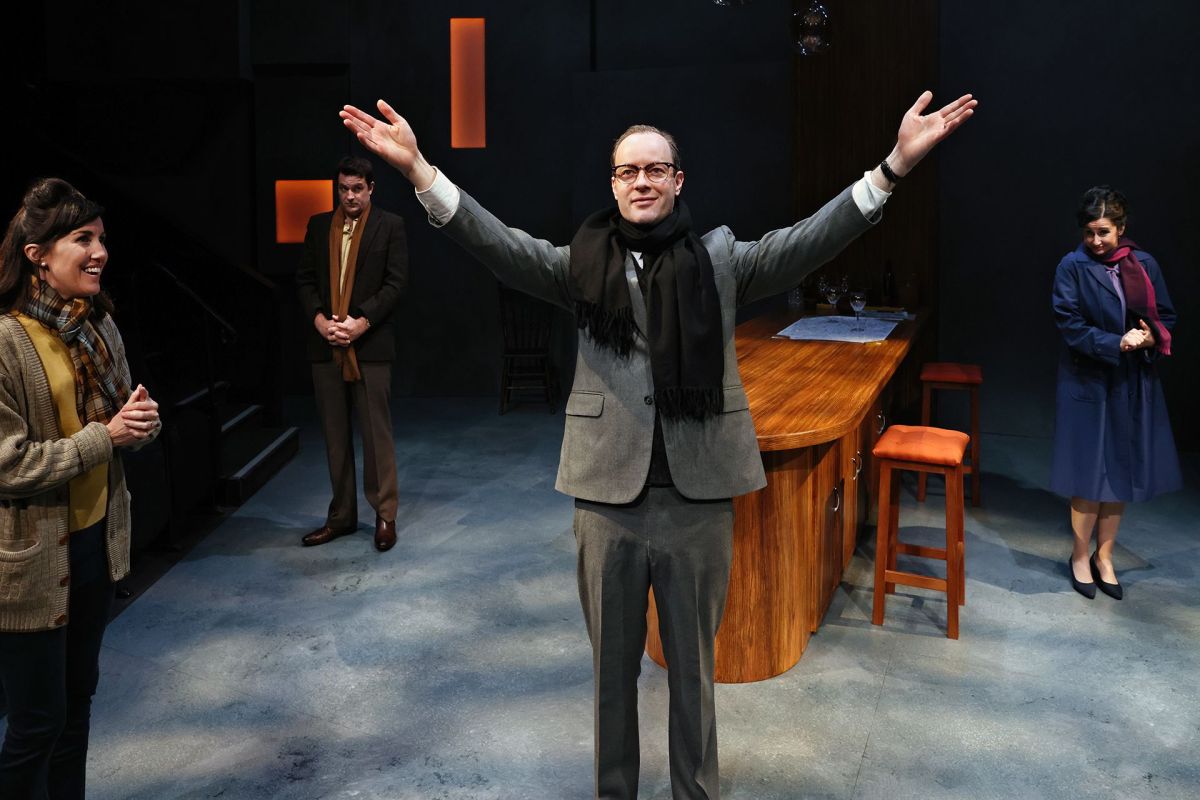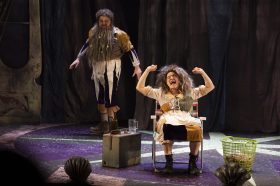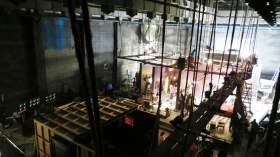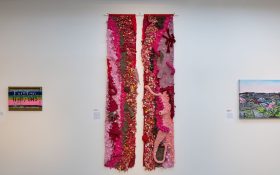Benefactors, written by Michael Frayn, is a self-indulgent, delicately constructed comedy that thematically aspires to critique approaches to affordable housing in 1960s England.
The play is almost entirely set within the home of David (Gareth Davies) and Jane (Emma Palmer), a content, married, middle-class couple. The inciting event of the play is architect David’s “brilliant” idea to build a new urban apartment block in the middle of an existing lower-class neighbourhood. As the play progresses he’s met by a series of obstructions to the realisation of his project.
The central source of conflict and comedy is instigated by a neighbouring couple, Sheila (Megan Drury) and Colin (Matt Minto). Sheila and Colin are the type of people who outstay their welcome. Sheila is a sap of a woman who wishes she was someone else. Colin is grandiose, brash and apparently without substance. Neither character appears to have agency, but for their interaction with David and Jane.
Benefactors is quiet and conservative in its language, befitting the period in which it is set. The nuclear family is still operating in a traditional English model, exemplified through David and Jane’s marriage and home, which creates a secure fulcrum that withstands all manner of crises. Almost everything in the play happens around the dinner table. This motif is symptomatic of the time before television started luring people away from this central piece of furniture and family life.
Direction by Mark Kilmurray is nuanced and patient, where the players are encouraged to let the writing play its part. He allows the construction on the page to act as the template on which all else is built. This enables a flawless collaboration between writer, actors and the creative team. The structure of the play is a series of long monologues delivered directly to the audience, interspersed with scenes of group interaction and movement at once simple and highly stylised. The players rarely leave the stage, but simply stand or sit, allowing action or inaction to direct the audience’s focus. The way movement and stillness are used offers the play a contemporary aesthetic and creates a visually interesting display.
The cast of Benefactors are balanced in their energy and performance as an ensemble. As anthropologist Jane, Palmer is the bedrock of the household and the play. Cool and hip as a 1960s wife and mother, she is the contemporary equivalent of the “super mum”. Ever calm, her ability to create a complex and multilayered woman is foundational within the world of the story.
As played by Davies, David is more simple a figure. A bit childlike in his joy and weak in his dependence on his wife, he’s an almost unflappable, likeable and altogether believable man.
Drury’s Sheila is a pathetic simp of a woman; she contrasts well against her husband, Colin, as played by Minto, who is a large, overconfident character. Drury is convincing in playing a woman who has no substance of her own and is beaten down by a narcissistic partner. They are brilliant bringers of toxicity to the wholesome world of Jane and David, and work against David’s optimism.
Set and costume design by Nick Fry is aesthetically 1960s, but stylistically contemporary. Both manage beautifully to invite the audience into the world of Benefactors without being overt or kitsch. A special mention must go to Linda Nicholls-Gidley, whose role as dialect coach has resulted in accents that draw no attention to themselves, but support the establishment of class, time and place within the play.
Overall, the play seems an odd and perhaps out of touch choice for an Australian stage in 2023. Theoretically it may seem to grapple with current themes of social housing, urban high-rises and affordability, but these very real and important topics are never really dealt with and form only the backdrop to the plight of a very secure middle-class couple who are personally unaffected by the housing crisis except to speculate and trade in enterprise about future home creation.
Read: Book review: Personal Score, Ellen van Neerven
To this reviewer it still translates as well-off people, talking about poorer people and what is good for them. While this may well be the point of the play, being staged on the shore of Sydney Harbour, a short walk from Kirribilli House, opposite apartments where the median price is $1.2 million, it feels disconnected and ill-conceived. Benefactors is executed beautifully; yet the aftertaste is a sour one.
Benefactors by Michael Frayn
Director: Mark Kilmurry
Assistant Director: Margaret Thanos
Set and Costume Designer: Nick Fry
Lighting Designer: Max Cox
Sound Designer: David Grigg
Dialect Coach: Linda Nicholls-Gidley
Stage Manager: Isabella Kerdijk
Costume Supervisor: Renata Beslik
Cast: Gareth Davies, Megan Drury, Matt Minto, Emma Palmer
Benefactors will be performed until 22 July 2023.





